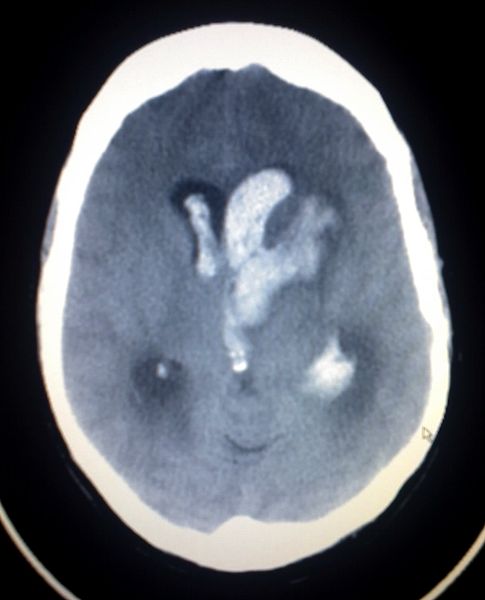Intra-axial hematoma: Difference between revisions
No edit summary |
|||
| Line 15: | Line 15: | ||
There are two main kinds of intra-axial hemorrhages: [[intraparenchymal hemorrhage]] and [[intraventricular hemorrhages]]. | There are two main kinds of intra-axial hemorrhages: [[intraparenchymal hemorrhage]] and [[intraventricular hemorrhages]]. | ||
== | ==Related Chapters== | ||
* [[Traumatic brain injury]] | * [[Traumatic brain injury]] | ||
* [[Intracranial hemorrhage]] | * [[Intracranial hemorrhage]] | ||
Revision as of 14:54, 12 February 2013
| Intra-axial hematoma | |
 | |
|---|---|
| Intracerebral hemorrhage |
|
Intracranial hemorrhage Microchapters |
Editor-In-Chief: C. Michael Gibson, M.S., M.D. [1]
Overview
Intra-axial hemorrhages, or intra-axial hematomas, are a subtype of intracranial hemorrhage that occur within the brain tissue itself.
Intra-axial hemorrhages are potentially deadly because they can increase intracranial pressure and crush delicate brain tissue or reduce its blood supply, causing ischemia. The other category of intracranial hemorrhage is extra-axial hemorrhage, such as epidural, subdural, and subarachnoid hematomas, which all occur within the skull but outside of the brain tissue.
There are two main kinds of intra-axial hemorrhages: intraparenchymal hemorrhage and intraventricular hemorrhages.
Related Chapters
References
Template:Cerebral hemorrhage de:Intracerebrale Blutung nl:Intracerebraal hematoom